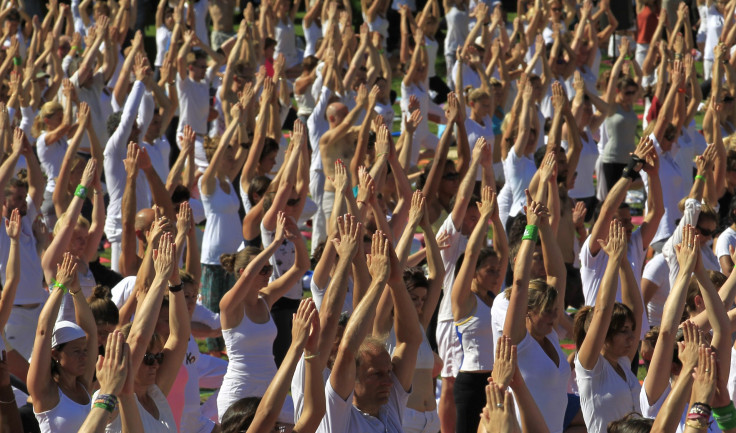Yoga Helps Heart Patients With Paroxysmal Atrial Fibrillation Lower Blood Pressure And Improve Mental Health

Atrial fibrillation disturbs the rhythm of your heart, causing it to either beat too fast, too slow, or with an irregular, syncopated rhythm. Chest pain, dizziness, and shortness of breath usually accompany episodes of fibrillation — the word for very fast and irregular contractions. Patients naturally feel stress and anxiety when these symptoms arise, especially when it comes to paroxysmal AFib, which can cause them to occur unexpectedly.
A new study of people diagnosed with paroxysmal AFib suggests yoga can help reduce not only the stress associated with the condition, but also patients’ high blood pressure and heart rate. In fact, participants who practiced yoga for a 12-week period measured “significantly lower”on heart rate and blood pressure compared to participants who did not.
Inside Your Heart
AFib is the result of an electrical disorder in the atria, the heart’s two upper chambers. When a fibrillation happens, blood doesn’t pump completely into the heart's two lower chambers, called the ventricles, and instead pools in the atria. The heart’s strange rhythm is a result of the upper and lower chambers not working together as they should.
Doctors describe the condition as either paroxysmal, persistent, or permanent. While the arrhythmia of paroxysmal AFib stops on its own in less than a week’s time, persistent AFib will continue for more than a week, and in some cases will require treatment. Over time, both paroxysmal and persistent AFib may develop into the most extreme version of the condition, known as permanent AF. Medicine cannot restore the normal heart rhythm in patients with permanent AFib.
Naturally, patients with paroxysmal AFib want to prevent the worst from happening.
“Practising yoga may decrease stress and have positive effects on mental and physical health,” wrote the authors of the study, led by Maria Wahlström, a PhD candidate at the Karolinska Institute in Stockholm. Wahlström and her colleagues investigated whether this ancient practice developed in Northern India might benefit AFib patients at the earliest stage of arrhythmia.
Sun Salutations
For the study, the researchers examined 80 patients, all diagnosed with paroxysmal AFib, and measured their blood pressure and heart rate. Using survey questions, the team also evaluated each patient’s quality of life and mental health. Next, they divided the patients into two groups: A control group received standard treatment for the 12-week period, while the other received standard treatment plus yoga. At the end of the study, the researchers examined the patients once again.
Though the control group had higher mental health and quality of life scores at the beginning of the study, the yoga participants averaged higher mental health scores by the end. The yoga group also had significantly lower heart rate and systolic and diastolic blood pressure compared to the others. The group met just once a week to practice a meditative form of yoga, Wahlström said, suggesting some of the participants may have also practiced at home on their own.
She and her colleagues also noted some yoga participants reported higher quality of life following the study, a finding that helps to explain the beneficial results, which also gain support from previous research. One recent review of past studies, for instance, suggests yoga is effective in treating depression and anxiety. Another recent study found the practice can impact physiology, lowering risk factors for cardiovascular disease.
Currently, the Centers for Disease Control and Prevention estimate up to 6.1 million people in the United States have AFib. Wahlström and her colleagues say yoga might serve as a complementary treatment for patients with paroxysmal AFib in order to prevent their condition from worsening. Yoga is affordable and accessible for many people, including older adults. Because it comes in different forms — some focused on breathing and posture, others resembling a standard gym workout — most people can find a suitable practice that meets their needs.
Source: Wahlström M, Karlsson MR, Medin J, Frykman V. Effects of yoga in patients with paroxysmal atrial fibrillation – a randomized controlled study. European Journal of Cardiovascular. 2016.
Published by Medicaldaily.com



























